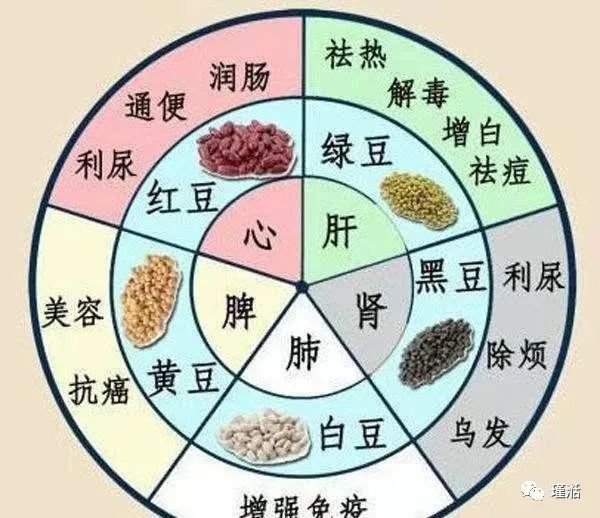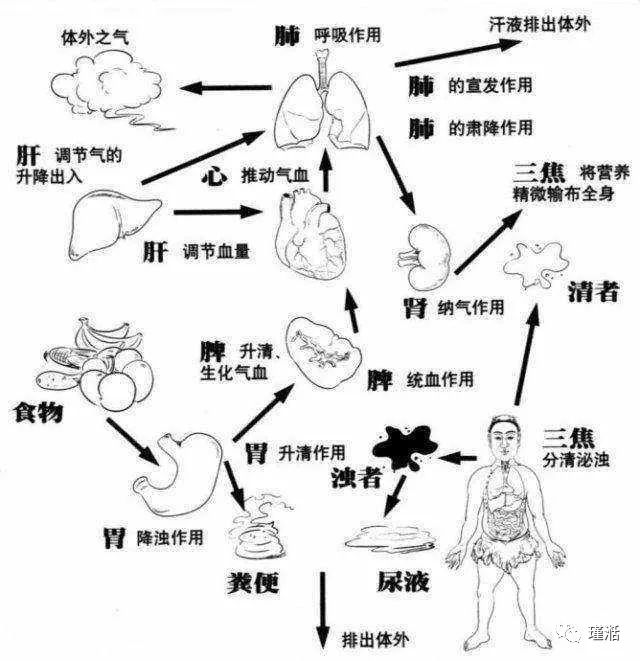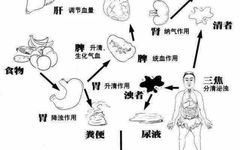
In Traditional Chinese Medicine (TCM), the Five Zang and Six Fu organs collectively referred to as zangfu (脏腑), are important organs located within the cranial, thoracic, and abdominal cavities. This term represents a comprehensive concept that unifies both structural morphology and physiological functions. The Five Zang primarily include the Xin (心, Heart), Fei (肺, Lung), Pi (脾, Spleen), Gan (肝, Liver), and Shen (肾, Kidney), while the Six Fu mainly refer to the Dan (胆, Gallbladder), Wei (胃, Stomach), Xiao Chang (小肠, Small Intestine), Da Chang (大肠, Large Intestine), Pang Guo (膀胱, Bladder), and San Jiao (三焦, Triple Burner).

1. Five Zang:
1. Xin (心, Heart): The primary functions of the Heart are to govern the blood vessels and the spirit. The Heart governs the blood vessels by promoting the circulation of blood throughout the body, nourishing and moistening tissues. The Heart also governs the spirit, which refers to its role in overseeing the physiological activities of the Five Zang and Six Fu, as well as mental activities such as consciousness and thought. These two functions are interconnected; the spirit and blood must be in harmony for the body to function normally.
2. Fei (肺, Lung): The Lung’s main functions are to govern qi, control respiration, and regulate the distribution of fluids. The Lung governs qi and respiration, meaning it regulates the body’s qi and facilitates breathing. The Lung also governs the dispersal and descending of qi, expelling turbid air and assisting in the excretion of sweat. Additionally, the Lung regulates the pathways of fluids, ensuring proper distribution of body fluids. It also exchanges clear and turbid qi, sending blood containing clear qi throughout the body.
3. Pi (脾, Spleen): Located in the middle jiao, the Spleen is responsible for transformation and transportation, ascending, and controlling blood. The Spleen transforms food and drink into essential nutrients and distributes these nutrients throughout the body. It also maintains the relative position of the internal organs and transports refined substances to the Heart and other organs, generating qi and blood to nourish the body. The Spleen controls blood, ensuring its normal circulation within the vessels and preventing leakage outside the vessels.
4. Gan (肝, Liver): The Liver’s functions include regulating the smooth flow of qi and storing blood. It ensures the smooth circulation of qi throughout the body and maintains the flow of blood and body fluids. The Liver also stores blood, regulates blood volume, and prevents excessive bleeding.
5. Shen (肾, Kidney): The Kidney is the foundation of storage, responsible for storing essence, governing water, and receiving qi. The Kidney stores essence, preventing its loss. It governs water, regulating the metabolism of body fluids. The Kidney also receives the clear qi inhaled by the Lung, maintaining the depth of breathing and preventing shallow respiration.
2. Six Fu:
1. Dan (胆, Gallbladder): Known as a unique Fu organ, it stores and excretes bile, assisting in the regulation of the Liver’s functions. The Gallbladder also governs decision-making, being the only Fu organ associated with mental activities, aiding in judgment and decision-making.
2. Wei (胃, Stomach): The Stomach is responsible for receiving and digesting food, as well as descending and harmonizing. It receives and digests food into chyme, working with the Spleen to transform it into essential nutrients that nourish the body. The Stomach also ensures smooth descent, facilitating further digestion and absorption after food enters.
3. Xiao Chang (小肠, Small Intestine): The Small Intestine is responsible for receiving and transforming food, as well as separating clear from turbid. It receives digested chyme and further transforms it into essential nutrients and waste. It separates the clear (nutrients and fluids) from the turbid (food residues), with the clear being absorbed and distributed by the Spleen, while the turbid is sent to the Large Intestine.
4. Da Chang (大肠, Large Intestine): The primary function of the Large Intestine is to transform and excrete waste. It absorbs fluids from the waste material processed by the Small Intestine, forming feces for elimination.
5. Pang Guo (膀胱, Bladder): The Bladder is responsible for storing and excreting urine. It stores urine until a certain level is reached, at which point it opens and releases urine through the Kidney’s qi transformation.
6. San Jiao (三焦, Triple Burner): As one of the Six Fu, the San Jiao is located in the abdominal cavity and primarily regulates the distribution of fluids and the flow of vital energy. It facilitates the distribution and excretion of body fluids, a process completed by multiple organs, but requires the San Jiao as a channel. It also serves as a pathway for the circulation of vital energy, allowing it to flow throughout the body and perform its functions.
The human body is complex, with each of the Five Zang and Six Fu organs having distinct functions. Only when qi and blood flow freely, and the organs work in harmony, can normal physiological activities be maintained. If any part of this system is disrupted, it may lead to discomfort, so it is essential to pay attention to one’s health and maintain good lifestyle habits.

